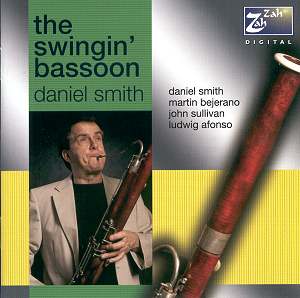Georg BASSMAN
(1914-1970)
I'm Getting Sentimental Over You [4.37]
Thelonious MONK
(1917-1982)
Well You Needn't [4.06]
Sammy NESTICO
(b.1924)
Hay Burner [4.45]
Charlie PARKER
(1920-1955)
Scrapple From The Apple [4.28]
Duke ELLINGTON
(1899-1974)
Mood Indigo [3.56]
Marcos VALLE
(b.1943)
Summer Samba [4.57]
Edward HEYMAN
(1907-1981), Johnny
GREEN (1908-1989)
Out Of Nowhere [4.29]
Sonny ROLLINS
(b.1930)
St. Thomas [3.25]
Johnny MERCER (1909-1976),
Victor SCHERTZINGER
(1890-1941)
I Remember You [3.39]
Hank MOBLEY
(1930-1986)
Home At Last [5.51]
Dizzy GILLESPIE (1917-1973)
A Night In Tunisia [5.12]
Daniel Smith (bassoon)
Martin Bejerano (piano)
John Sullivan (bass)
Ludwig Alfonso (drums)
rec. Acoustic Sound Studios,
New York, 4-6 January 2004
As I have mentioned before in a previous review,
Vivaldi
7 Favourite Bassoon Concertos Regis RRC 1277,
I am a great admirer of the way that Daniel
Smith is promoting the image of the bassoon
as a major solo instrument. However his attempts
at playing jazz on the bassoon do not succeed.
Georg Bassman's most famous
piece is probably 'I'm Getting Sentimental
Over You' which was written for the legendary
trombonist and band leader Tommy Dorsey. Sadly
the bassoon here is unable to reproduce the
subtle glissandos of the trombone. Intonation
problems are immediately apparent and this
is a constant problem throughout the CD. Maybe
Smith is trying too hard to reproduce jazz
effects and his playing occludes the otherwise
excellent playing of Berjerano (piano), Sullivan
(bass) and Afonso (drums).
The jazz pianist and composer
Thelonious Monk wrote his jazz standard 'Well
You Needn't' in 1944. Monk had a unique improvisational
style, full of dissonant harmonies. This is
shown in this piece, where the root moves
in semitones with alternate F and G-flat chords.
This works better than the first track, with
Smith displaying a fine technique in the upper
register.
Sammy Nestico is a big band
composer and arranger, best known for his
works written for Count Basie. His piece 'Hay
Burner' is well played by Smith who manages
a fine improvisation and tries to imitate
the glissandi and bending notes produced by
big band saxophonists. Maybe he could use
even more vibrato here. The track also has
a fine piano improvisation by Bejerano.
'Scrapple From The Apple'
is a composition by the legendary saxophonist
and composer Charles 'Bird' Parker Junior.
It is a bebop classic in that Parker bases
many of his successful tunes over well known
chord changes. 'Scrapple From The Apple' is
based over the chord progression of 'Honeysuckle
Rose'. Parker's wonderfully clear saxophone
sound does not lend itself well to the bassoon
which here sounds rather muffled by comparison.
No jazz sampler album would
be complete without a recording by the most
influential figure in twentieth century jazz:
Duke Ellington. Here he is represented by
Smith playing the standard 'Mood Indigo' .
A nice enough recording but marred once again
by poor intonation as also is 'Out Of Nowhere'
by Heyman and Green, which is a standard that
seems to work well on any instrument.
All credit to Smith in the
way he tries all kinds of styles on this CD.
Some work better than others. In 'Summer Samba'
by the Brazilian composer Marcos Valle, Smith
attempts to highlight Latin music in this
1966 Bossa Nova. However the powerful rhythms
seem to get lost under a wayward improvisation.
The prolific and long-lived
jazz saxophonist Sonny Rollins wrote the calypso
style piece 'St. Thomas' after Saint Thomas
in the Virgin Islands. Undoubtedly the highlight
of this track is the superb drum solo by Alfonso.
'I Remember You' is a classic
melody by Johnny Mercer with the collaboration
of Victor Schertzinger. This is a nice track
featuring an excellent bass solo by Sullivan
who also appears playing a bowed improvisation
on 'Home At Last' by the very underrated Hank
Mobley.
The CD ends with the all
time bebop classic 'Night In Tunisia' by Dizzy
Gillespie, who along with Charlie Parker,
was a major figure in the development of bebop
and modern jazz. This track works well as
an exciting finale to the album.
A brave attempt and all credit
to Smith for tackling such a project. Sadly
I don't think the bassoon will ever be regarded
as a major solo jazz instrument.
An interesting CD for bassoonists
and jazz lovers but intonation remains a challenge
unmet.
Lynda Baker
